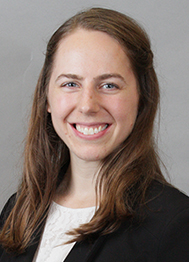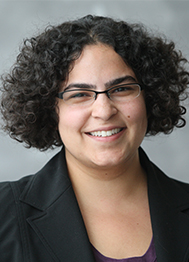Students gain real-world skills through immigration clinic
Students immerse themselves in hands-on client representation in Wayne State University Law School's Asylum and Immigration Law Clinic.
And they make a difference to the people they represent.
Third-year student Samantha Topolewski, with fellow student Gina Derderian, spent the majority of her clinic time  during the last semester - and more time, as well - representing an Iraqi national who was detained last summer. The students are under the guidance of Assistant Professor (Clinical) Sabrina Balgamwalla, who directs the clinic.
during the last semester - and more time, as well - representing an Iraqi national who was detained last summer. The students are under the guidance of Assistant Professor (Clinical) Sabrina Balgamwalla, who directs the clinic.
In June 2017, U.S. Immigration and Customs Enforcement officers arrested about 150 members of the metro Detroit Chaldean and wider Iraqi community, intending to enforce old removal orders without giving the detainees a chance to explain to a court the current dangers they would face in Iraq. The raids were part of the Trump administration's push to step up immigration enforcement.
"Our client came to the United States as a refugee, and has essentially lost all of his family, either through war or otherwise," Topolewski said.
The man has had runs-ins with American law enforcement, but has never directly injured another person, she said. Thus, he was detained after years of living free in the country.
During the crisis of the raids, the American Civil Liberties Union, CODE Legal Aid Inc. and volunteer attorneys stepped in to make sure all detained Iraqi immigrants had representation. The Wayne Law clinic was a part of that effort.
"When we started the semester at the clinic, we had to hit the ground running, and within the first two weeks of classes, we made a visit to Youngstown, Ohio, to meet our client for the first time, as that is where he was detained," Topolewski said. "We represented him for a bond hearing, filed a motion to reopen his case, completed his applications, filed his brief for his individual merits hearing, and represented him before the immigration judge for his hearings. In order to complete all this, we had to get documents from many different places to support his application and essentially put together the life of this individual who never had someone advocating for him before."
 It was a difficult case, and the women worked extremely hard. They were able to talk about the case with fellow clinic students, and get feedback and emotional support, she said. At the time of this writing, the client is still in detention.
It was a difficult case, and the women worked extremely hard. They were able to talk about the case with fellow clinic students, and get feedback and emotional support, she said. At the time of this writing, the client is still in detention.
"Over the semester, I was able to see the formation of a client-attorney relationship and the trust that comes with it," Topolewski said. "For our client, the mere fact that we were putting in so much work and advocating for him, especially when he had never had someone deeply in his corner before, was, I think, almost more important to him than the outcome of his case."
It is that human rights aspect of immigration law that attracted Balgamwalla to the field in the first place. She joined the Wayne Law faculty in 2017, following three years of teaching at the University of North Dakota School of Law, where she supervised an immigration clinic, and three years as a fellow with the University of Baltimore School of Law Immigrant Rights Clinic. Before entering academia, Balgamwalla was a nonprofit immigration and domestic violence attorney in Washington, D.C.
For students contemplating the study of immigration law, she offers this advice:
"Don't be afraid to reach out to immigration attorneys to network and get advice. The community is generous and supportive, particularly for new practitioners. This is one of the few areas of law where the majority of attorneys practice on one side of the adversarial system, so there is an abundance of cooperation, collaboration and mentorship."
Download high-resolution photos